Out of the Box
It’s been 5.5 years since we first introduced ourselves to you
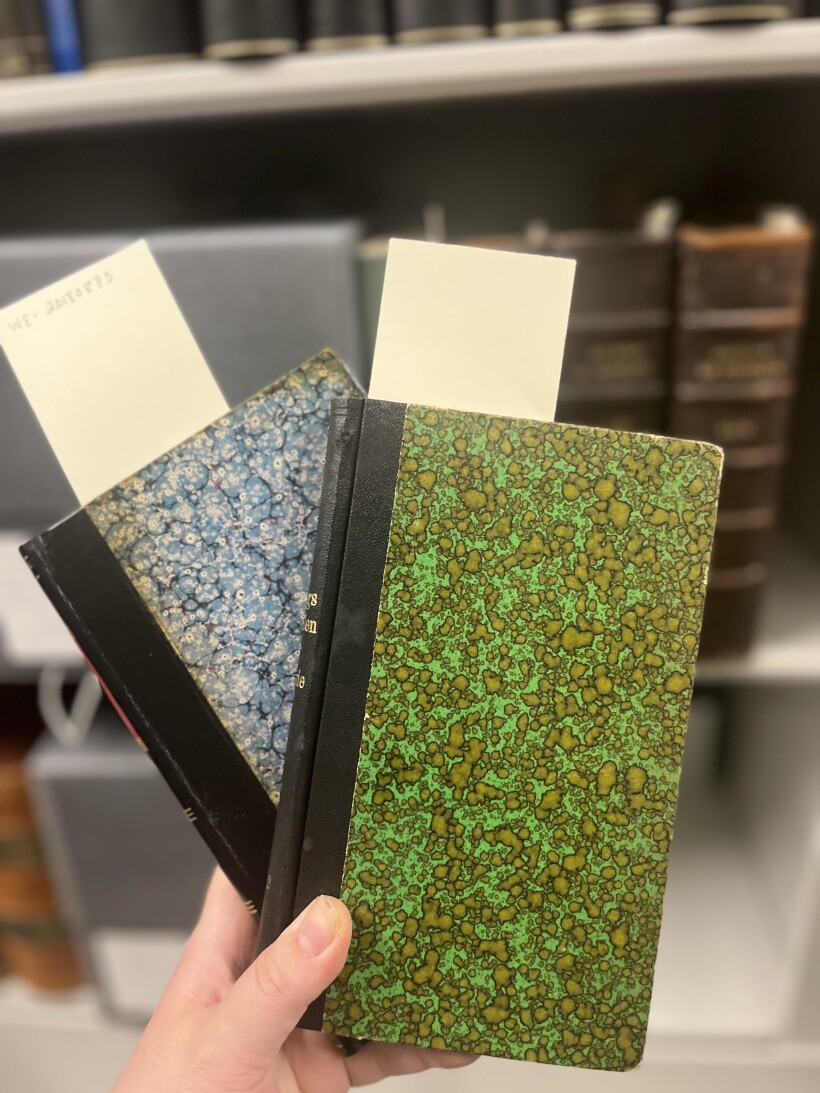
Library volumes. Courtesty of the Niels Bohr Library & Archives
Who are you and what do you do at NBLA?
Melanie Mueller: Greetings from the Director of the Niels Bohr Library & Archives. I’m an archivist by training but in my role as an administrator, I don’t have my hands in archival boxes as often as I would like. Instead, I feel connected to our collections through the work of the amazing NBLA team of librarians, archivists, and info professionals who you will learn about in this post. As the Director, I work on collection development, donor relationships, fundraising and grant development, and working with retired scientists and their families to find archival homes for their papers. I just celebrated my 20-year anniversary of working at AIP!
Allison Rein: Hi, I’m the Associate Director of the Niels Bohr Library & Archives. I’ve worked at NBLA since 2016, when I started as the Assistant Director of Special Collections. I manage our reference services and everything “library” aka book, like collection development, working with donors, etc. But I really have my hands in a little bit of everything, which is just how I like it, I’m a classic jack of all trades.
Karina Cooper: I am a librarian at the Niels Bohr Library & Archives and started here in Fall 2023. While my focus is cataloging new books and donations and working with metadata, I also participate in our reference and outreach teams, do preservation work, and write blogs and research guides.
Elizabeth Wood: I am an archivist at NBLA focusing on our photo and audiovisual collections, and I’ve been here for just over a year. I spend most of my time conducting preservation assessments, processing collections, and working on getting our materials ready for cold storage (more on that in future posts), but I also help with reference and our social media efforts.
Corinne Mona: Hello! I’m a librarian at NBLA and my work currently revolves around books and outreach. I started out with the organization in 2017 with very little idea of what an archive is, and now I am very involved with promoting our archival collections in addition to my first love, the books.
Benjamin Henry: I am an archivist at NBLA focusing on our physical manuscript collections. I like to say that I get to organize dead (usually) physicists’ mail so that historians can access them later. Like Elizabeth, most of my time is spent processing and describing our physical collections, and I also help with reference and social media.
Chip Calhoun: Hi, I’m the Senior Archivist at NBLA. I began working here in 2010 as the Technical Services Archivist, which meant working on information systems like our electronic catalog and other databases. I still spend a lot of time with that kind of work, now including the digital repository, along with being part of general archives work.
Allison Buser: I am an archivist at NBLA and the most recent addition to the team, starting in December 2024. My work specializes in our rapidly growing digital collections which largely involves processing and describing new digital material, ensuring its preservation, and depositing it in our online repository for wider discovery and access by our users. I also work on exciting digital initiatives projects to develop our digital infrastructure in anticipation of a digital first future and to collect important contemporary records from across the AIP federation and from physical scientists whose stories and narratives document the state of the field at a crucial time.
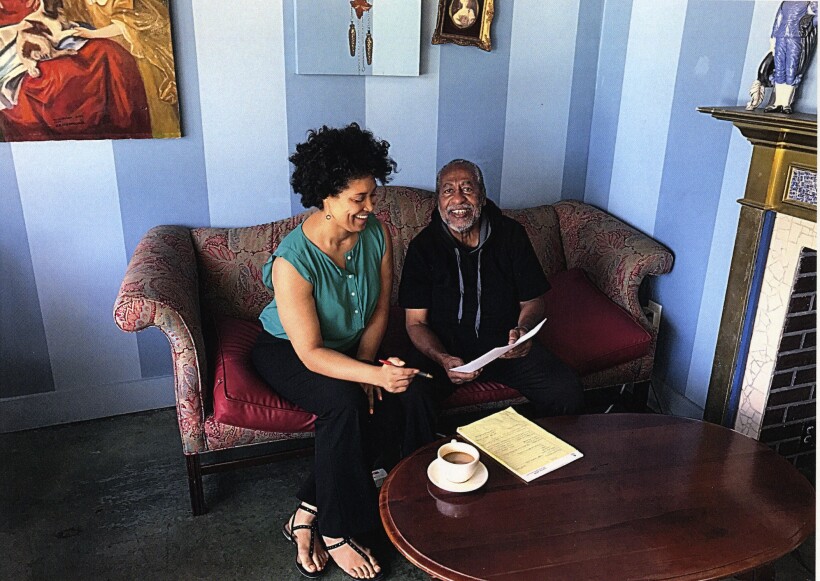
Dr. Ron Mickens and reference librarian Imani Beverly examining manuscripts copies at Amelia’s French Bakery in Atlanta, Georgia on August 16, 2017. Beverly helped Mickens conduct research on Elmer Imes at the Atlanta University Center. Dr. Mickens’ research on the African American presence in physics turned into a book and a collection, both of which are available at the Niels Bohr Library & Archives.
Credit line: AIP Emilio Segrè Visual Archives, Ronald E. Mickens Collection
Mickens Ronald C27
What does an average work day look like for you?
Corinne Mona: My days are almost never the same. Some days, there are digitization requests and reference questions that require timely and time-absorbing responses. Since I’m involved with or helping to run a lot of our outreach, there is always something to edit, write, or organize: blog posts, social media, tours, Wikipedia editing, and more. Honestly, some days end up being lots of emails and meetings as we organize our many endeavors. I also buy books for the collection, along with Allison Rein, so we often confer with each other and with our historians on what to purchase for the collection. By the way, we take requests
Benjamin Henry: While no one day is ever completely the same, I would say I have a few routines. On days that I come to the library in-person, I always start with a cup of tea at my desk and catch up on things I can do at my computer like emails, reading professional articles, research for a blog post, etc. Once I’ve finished my cup of tea, I shift gears into processing our collections, which typically involves things like reboxing, refoldering, and my favorite part: snooping through collections for hot historical gossip (some of which makes it onto social media).
Melanie Mueller: While not terribly exciting on the surface, much of my time is spent in meetings: catching up on the work of the team, staying informed about our evolving digital collections strategy, planning for collaborations and other events, and looking at the business side of the library (budget, hiring, vendors, paperwork, etc.)
What, if anything, has changed in your job since COVID?
Allison Rein: Most of our meetings are virtual or hybrid now, it’s a rare treat to have a 1 to 1 in person, though we try to have our monthly team meetings in person. The biggest change was probably to our reference services though, our reading room is quieter than ever but our virtual reference spaces (email, virtual reference appointments, digitization) are busier than ever. We can’t assume that how we used to do things is how we’ll continue to do things so we have to be nimble and adaptable and responsive to what our users need.
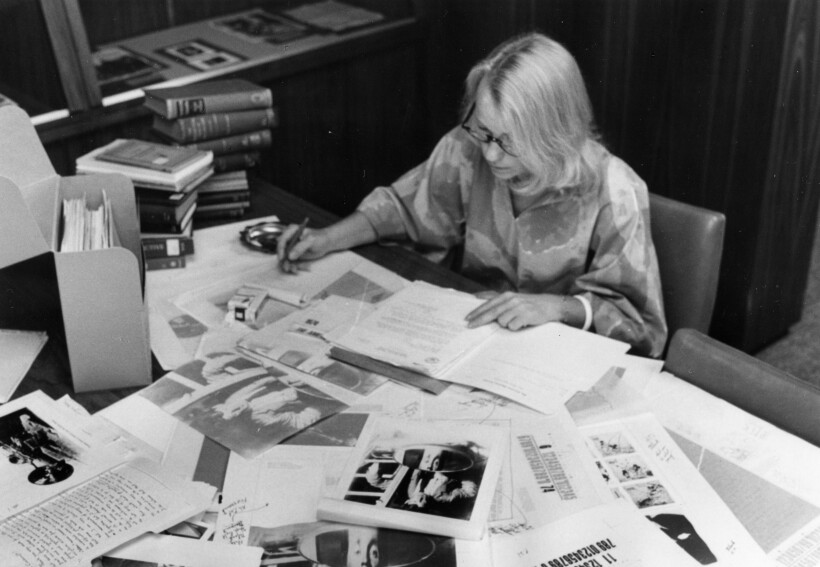
Portrait of Joan Warnow-Blewett
Credit Line: AIP Emilio Segrè Visual Archives, Physics Today Collection
Is there anything you’ve done at NBLA that you never expected to do in your career?
Allison Rein: I never expected to be the Executive Producer of a podcast, but I did! It was the result of having a grant to do outreach with a specific book collection during the pandemic when large events were out of the question. I envisioned another way to reach a large number of people with our grant funds and low and behold a few years later we released 12 episodes of Initial Conditions: a Physics History Podcast.
Elizabeth Wood: I never expected to be a Wikipedia editor, but we host internal Wikipedia edit-a-thons with NBLA staff each month. It’s been an interesting way to get familiar with our collections and learn more about less well-known scientists. One of the first articles I worked on was an expansion of a stub about Ann Merchant Boesgaard,
Corinne Mona: As someone without a science background, I never expected to work in a science-adjacent position, and I certainly never expected to develop a great affection for physics history – which I have!
Benjamin Henry: Like Corinne, I think the most unexpected part of my job has been that I work here at all. I have very little science background—in fact, I was the black sheep of my family who did not choose a science-related career and instead went into languages and social sciences. It was quite ironic then that I ended up working at a place like this, but I love history and have enjoyed still being able to be immersed in it, even if it was not the kind of history I was expecting.
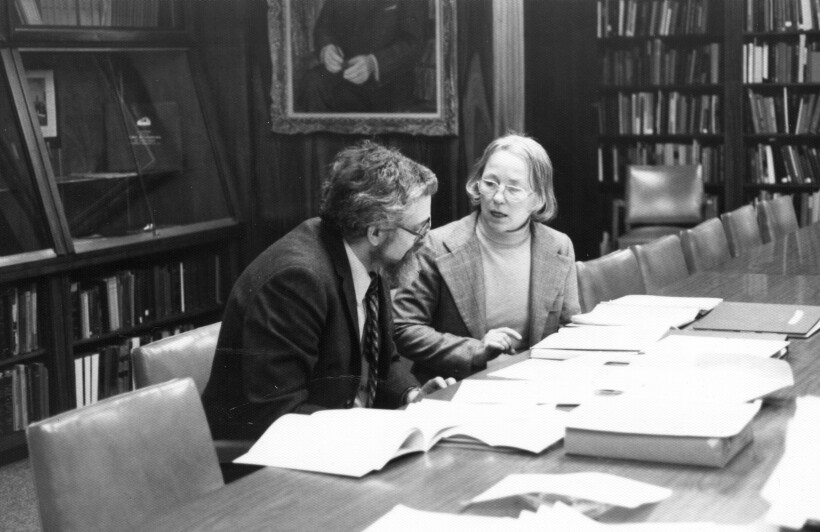
(L-R): Sam Schweber and Joan Warnow-Blewett conversing in the Niels Bohr Library in New York. The Library relocated to College Park, Maryland in the 1990s. Credit Line: AIP Emilio Segrè Visual Archives
Schweber Sam C1
What’s a project you’ve worked on at NBLA that you’re really proud of?
Elizabeth Wood: Last summer at the Society of American Archivists annual conference, I heard about a reference service some libraries are offering called a Virtual Reading Room. After some research and experimentation, I’m really proud that we now have our own Virtual Reading Room service available for researchers! Shameless plug: you can find out more about it here: https://aip.libcal.com/reserve/vrr
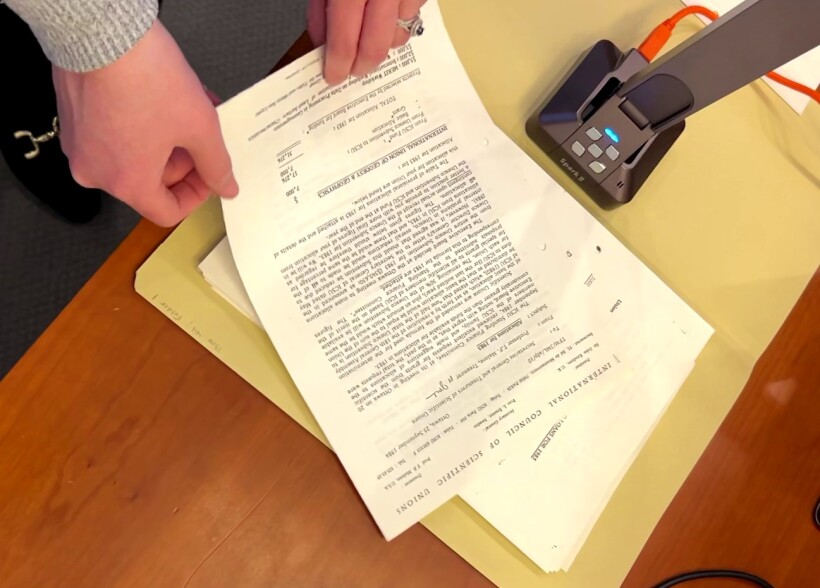
Virtual reading room in action.
Benjamin Henry: Most of us at NBLA write posts for the library’s blog Ex Libris Universum
Allison Rein: Not a project per se, but I’m really proud of the changes I’ve instituted to the Library’s collection development policy. The last draft was written in 1997 and it was very broad. When I came to the Library in 2016 one of my first tasks was updating the formal policy to include more specific guidelines and goals and now we explicitly seek out works by about about underrepresented people in physics.
Most of the Library’s books have been acquired through donation, which is a great way to get the crème de la crème of the scholarship, but has major gaps around history, culture, and rare books. We’ve been really lucky to have enough funding to buy books every year. In addition to updating our policies to explicitly include rare books and gaps in the collection, I also instituted more tracking and documentation around acquisitions. As a result, we’ve been able to acquire some amazing publications that demonstrate the breadth and depth of our physics history and its connection to humanity. I’m also proud that we’ve focused so much on documenting the efforts of women, indigenous people, people of color, LGBTQ+, and other underrepresented groups in science in our collections.
Some examples are:
Greenham Common Women’s Peace Camp zine .
Optimism and Other Poems by Laura Dickinson
Athanasius Kircher’s Phonurgia Nova
Atomics for the Millions
More blogs highlighting our acquisitions are available here
You can view all of our most recently catalogued books via WorldCat
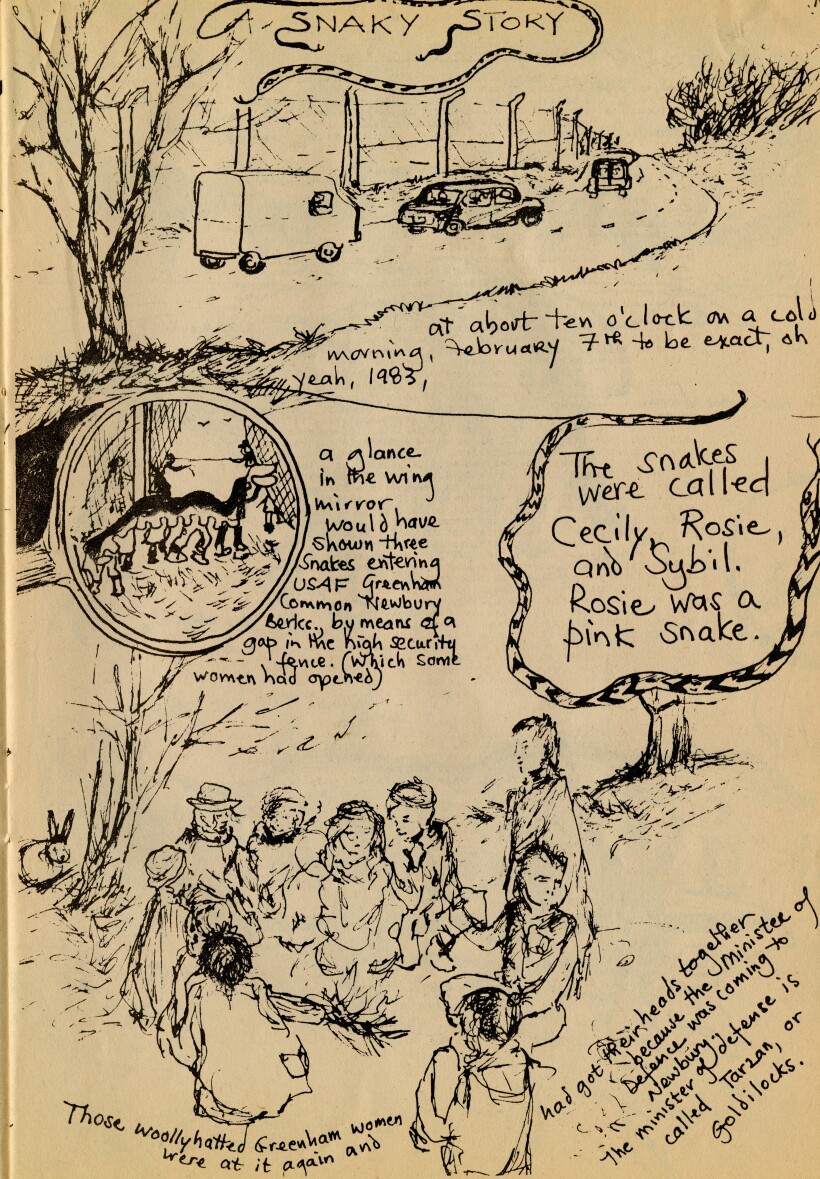
From the Greenham Common Women’s Peace Camp zine: A portion of the comic “A Snaky Story,” likely drawn by Gillian Booth. Photo courtesy of the Niels Bohr Library & Archives
Voices from a feminist antinuclear encampment
Where did you work before you started at the Niels Bohr Library & Archives and how has that affected your work here?
Elizabeth Wood: I worked at the Los Angeles Philharmonic as a digital asset specialist for two years before starting at NBLA. I worked with our digital archives, doing cataloging work and copyright research. A lot of the copyright complications from that job have carried over into my current work with the Emilio Segrè Visual Archives, so having that experience has been helpful. It was also good practice working with digital files, since a lot of AV collections work results in digitization and then maintenance of those digital files.
Allison Rein: I worked in various departments at the Maryland State Archives for almost a decade. I started in the Conservation Lab where I learned to do lots of conservation treatments (removing tape was my favorite, very meditative, but please don’t use tape on anything you value) as well as lots of prep work for digitization (disbinding, custom enclosures, etc.). I also worked in the Library doing cataloging. However, most of my time was in Special Collections where I worked as a jack of all trades doing reference, processing, outreach, and appraisal, though my focus was on newspapers. Newspapers provided the perfect training ground for thinking about description, physical care, digitization, and access of archival and library material, which I still do almost every day and week of my career. I used to have nightmares about giant fragile newspaper volumes every once in a while, but secretly I kind of miss them.
Chip Calhoun: Before coming to NBLA I worked for a few years as a contractor in the library of the Government Accountability Office. My first job position them was in records management, working with each department to collect records at their end-of-life which were ready to be either moved into permanent storage or destroyed. My larger task in that position was to overhaul and maintain the databases which GAO used to track this records disposition work. I moved on to helping manage a large scale digitization project of the GAO’s legislative histories. Before working at GAO I worked with a different contracting firm doing archives work for several clients, the highlight of which was working with papers of scientists at the National Library of Medicine.
Benjamin Henry: As far as library work goes, I only graduated with my Masters of Library and Information Science last year. For the entire time I was studying for that degree I worked in the Maryland and Historical Collections area of University of Maryland’s Special Collections and University Archives, where I fielded and answered reference requests and managed special projects, as well as teaching a few classes about how to use archival materials. I also worked in the libraries to teach information literacy sessions to first-year students, and did a field study conducting a diversity audit of the Art Library’s collections. Before libraries, however, I worked as a freelance Chinese-English translator and taught English for a year in Shanghai. All of this has affected my work at NBLA—obviously the archival experience was useful, but also my teaching experience helps with reference and building connections with people (we have taught a few sessions here at NBLA and want to do more!), and I have even been able to make use of my language skills. Aside from the blog post I mentioned earlier, I have been able to fix metadata issues in our photo collections such as misspelled Chinese names, and I have been able to help our librarians catalog books in Chinese.
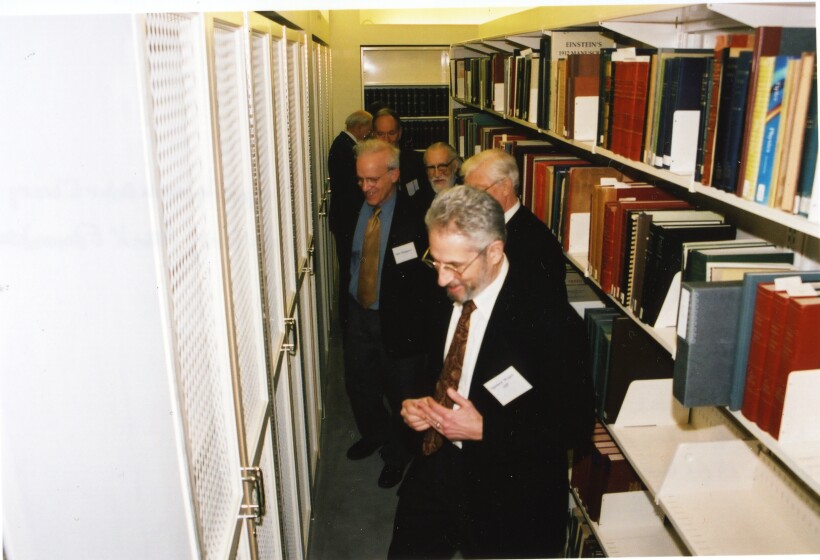
Spencer Weart (foreground) leads a tour through the Niels Bohr Library on its 40th Anniversary
Credit Line: Photograph by Malcolm Tarleton, AIP Photographer, courtesy of AIP Emilio Segrè Visual Archives
Weart Spencer D1
Do you have a favorite physicist?
Allison Rein: Before I started working here, I could’ve maybe named 3 physicists (Einstein, Newton, Curie) but now my head is filled with too many physicists to pick just one. My current favorite is Carleen Hutchins, a self-taught acoustician and violin maker. I’m in awe of her ability to learn how to do cool things and then do them excellently. She was also a high school science teacher, very jealous of all those kids.
Benjamin Henry: I’m not sure if she’s my favorite, per se, but a physicist I’ve become quite familiar with is Wang Mingzhen (or Ming-chen). In my free time I have been slowly translating her short autobiography from Chinese into English, and the act of translation really forces you to try getting into someone’s head in a way that simply reading their work doesn’t allow. While one could list her accomplishments, like being the first Chinese woman to work in statistical mechanics or to become a professor at the prestigious Tsinghua University, I really feel for her because at the end of the day she seems like she was just a nice introvert who wanted to do her science in peace, but misogyny and the turmoil of the 20th century constantly had other plans for her.

Portrait of Wang Mingzhen. First female Chinese physicist working in statistical mechanics. AIP Emilio Segrè Visual Archives
Why did you become an information professional?
Karina Cooper: I went into library science because I wanted to find a field where I could combine my interdisciplinary academic interests. In undergrad, I studied astronomy and classics (Latin & Ancient Greek), but also worked at a music library. I realized doing some collections work at the library that the same joy I found going down the rabbit hole of research or logic of solving equations or parsing ancient prose, could be found in library work too. I never dreamed I would find a job where I would use my background literally, but getting to work with 17th century books in Latin about astronomy has been amazing.
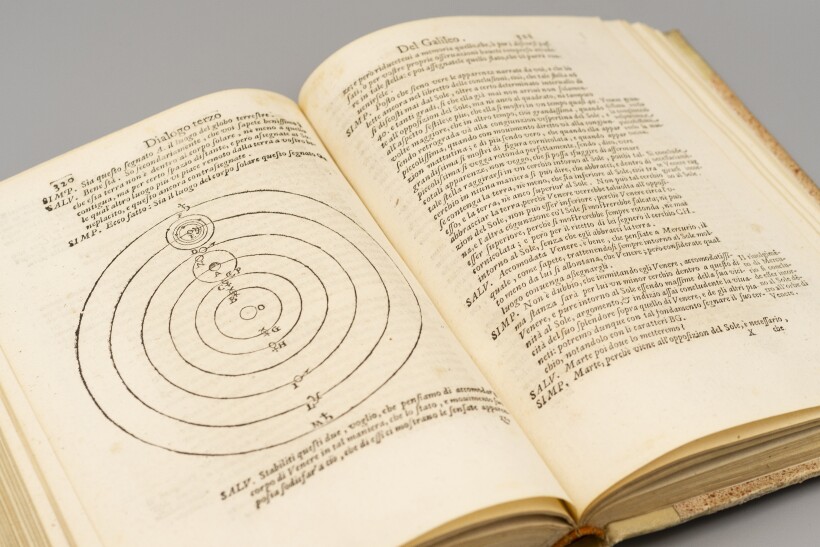
Galileo’s Dialogue Concerning the Two Chief World Systems, 1632
Corinne Mona: I have found information science to be a very welcoming and inclusive field, perfect for people who have many interests and enthusiasms like myself. As someone whose organizational skills were somewhat lacking in my youth, it’s been a wonderful way to learn them (and you will learn them as an information professional!). Oh, and did I mention that I like books? It was my childhood dream to be accidentally locked in a library overnight.
Allison Rein: I don’t have a wise answer, I went to library school because I loved books and history and never wanted to stop learning. I had no idea what I was in for.
Benjamin Henry: I had no original intention of getting into libraries. I was always more focused on language work. That is, until I started working as a freelance translator and realized that I absolutely hated the freelance lifestyle. I learned that what I enjoyed about it was the way in which I was able to make information accessible to people who otherwise would never be able to see it, but I couldn’t stand the isolation and lack of structure. I wanted to be able to make information accessible to people, but also be able to talk to people face-to-face and have an HR department and W-2 forms. That’s when my partner suggested libraries, since making information available to people in a structured environment is exactly what they do, and I thought, “Huh...that’s a really good idea!” We had recently moved to Maryland so I was able to get in-state tuition at UMD’s MLIS program, so I decided to take a chance and have never looked back.
Melanie Mueller: My mom was a reference librarian in a public library and I thought she had the coolest job! She inspired me to go to grad school even after I spent years loudly proclaiming that I would never darken the door of a university again. I thought I was destined for the reference desk and had never considered archival work until I attended an open house at UMD. Once I caught the archives bug, I quickly jumped from the library program to the archives program and never looked back.
What piece of advice would you give someone entering the library or history of science fields?
Karina Cooper: For library students, my advice would be to take the time to explore and learn what aspects you enjoy or not. Finding internships or even job shadows, to get hands on experience or a look at what goes on behind the scenes can be very helpful and may expose you to aspects of librarianship you were not familiar with before.
Allison Rein: Definitely definitely hands on experience in libraries, archives, and museums; as many different ones as possible. Before getting my first permanent professional job I volunteered in a public library, did a field study at a museum library, and had a short-term job in a government history center. All of that was in addition to my library job, and there’s still so many things I didn’t learn.
Benjamin Henry: Don’t get into libraries because you like books. Get into libraries because you like helping people. Enjoying books is a plus of course, but you’re not going to be sitting around reading all day for your job. You’re going to be helping people find the resources they need, whether that be actually talking to them to figure out what they need or creating physical and digital infrastructures to foster accessibility of your resources. While there are a few jobs in the library world that can allow you to be an introverted hermit, at the end of the day everything we do is in service of our patrons.
What do you do for fun outside of work?
Allison Rein: In addition to the very cliched answer of reading I will add the slightly less cliched answer of gardening. If you ever meet me in person, please ask me for a book recommendation and which creature is my current garden nemesis. Chaos gardening is my vibe though so please don’t ask me for any advice, I am not a gardening role model.
Elizabeth Wood: I like to do jigsaw puzzles and play board games. I also spend a lot of my free time playing in my toddler’s world – building block towers, pushing toy cars down ramps, coloring, that sort of thing. When I can get away, I like to go hiking; my sister and I are (very gradually) working our way through England’s South West Coast Path
Corinne Mona: Lately, it’s been sampling all my neighborhood has to offer in the way of bubble tea, gelato, and ice cream, and going on long walks to take in the beautiful weather.
Benjamin Henry: Despite what I may have implied earlier, I do actually enjoy reading a lot, and I go through a lot of audiobooks in particular (the Libby app is my best friend and it should be yours too). I also enjoy making Chinese gongfu style tea (my only tattoo is of a teapot), travelling, cooking, and I recently got into knitting. I also play DnD every week, for which I write too many character backstories that I’ll probably not get around to using for several years.
Melanie Mueller: Like Allison, I enjoy chaos gardening in my spare time around the house. I also love encouraging my two sons to make things with their hands, explore the outdoors, and get messy. When I have time to myself, I go junk and “antique” shopping, mostly to grow my collection of mid-century restaurant ware (only those with dark green accents, thank you very much).



